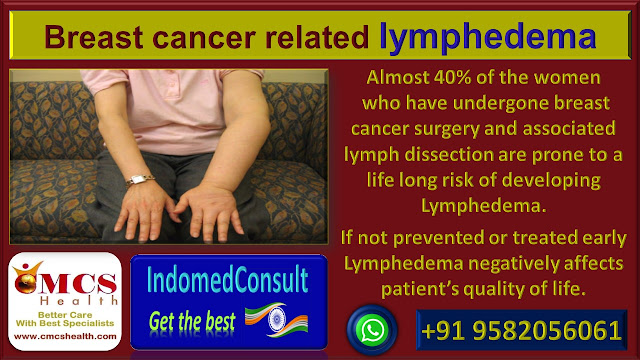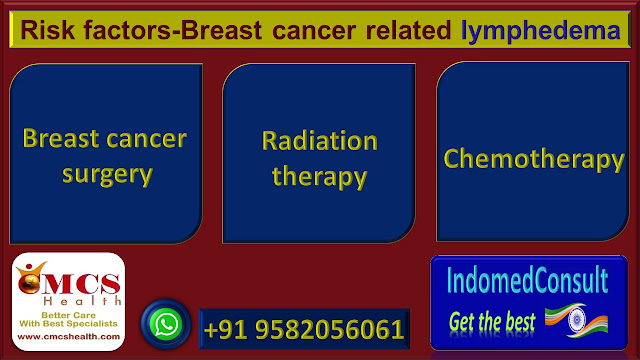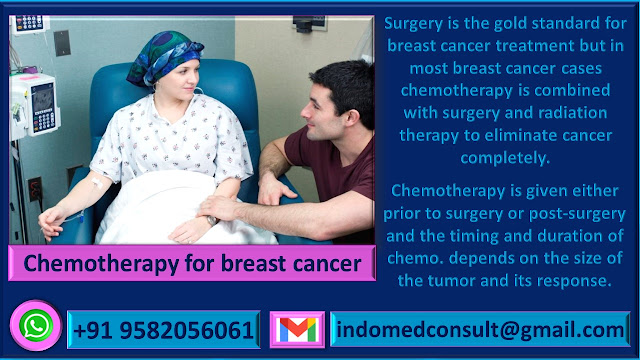What is breast cancer treatment-related lymphedema ( BCRL):
- Drains out the extra fluid consisting of toxins and other waste products, formed due to metabolism between the cells into blood stream.
- Lymph helps in absorbing the fats and proteins from small intestine by transporting it to blood stream.
- Lymph also contains white blood cells that form the immune system of the body to fight again infections.
Signs and symptoms of Lymphedema:
- A recent change in skin either in appearance or texture such as itching , tightness, redness , rash or tightening.
- Feeling of discomfort , achiness , tingling or increased warmth in affected area hand , chest, breast or underarm.
- Feeling fulness or heaviness in affected area arm , chest , breast , underarm, shoulder or back.
- Tightness or difficulty in moving shoulder , hands and wrists.
- tenderness in the elbow
- Burning or shooting pain sensations that may seem like pricking with pins and needles.
- Slight puffiness or swelling in arm, hand, breast, or chest with a temporary indentation of the skin when one presses on it with one's finger (this is called pitting edema).
- Veins or tendons in the hand that are harder to see, knuckles that look less pronounced, or once-wrinkled skin that looks smoother.
- Fever or flu like symptoms
What are risk factors associated with breast cancer treatment related lymphedema:
Breast cancer surgery as causative factor for lymphedema:
An extensive breast surgery for treating breast cancer can disturb the lymph drainage channels of lymphatic system and may become a causative factor for lymphedema. Total mastectomy as compared to lumpectomy increases the risk more.
Breast cancer radiation therapy as causative factor for BCRL:
Radiation treatments for breast cancer can affect the lymphatic system. Scar tissue from radiation therapy may press on or narrow the lymph vessels and nodes that remain after breast cancer surgery. This damage interferes with the flow of lymph out of the arm and upper body.
Lack of breast reconstruction post breast cancer surgery as a causative factor for BCRL:
Chemotherapy induced breast cancer treatment related lymphedema:
Obesity and living a sedentary life style as a causative factor for BCRL:
Any injury or infection can flare up BCRL:
Air travel as causative factor for BCRL:
How you can reduce risk of BCRL post breast cancer treatment:
- Taking good care of arm on the surgery side.Your breast cancer surgery team doctors will advise you to elevate the affected arm a few times a day for the first 24 to 48 hours after surgery. You will be advised when it is safe to prop up the affected arm on pillows.
- You will be advised to stretch your arm to workout the underarm. Most of lymph nodes are located in the armpit ( underarm) area. You may also be advised to lift the affected arm at shoulder height or above your head to restore the mobility and reduce chances of shoulder stiffness.
- Always inform the laboratory technician or nursing staff to prick the needle in the opposite arm for blood sample collection or medicine administering. Also blood pressure should be measured ( putting the blood pressure band) on the other arm.
- Protect against insect bites by using insect repellent (at least 50% DEET), and carry antiseptic cream for cuts and grazes.
- Limit your alcohol intake.
- Keep you arm clean and moisturized.
- Avoid wearing too tight sleeved clothes.
- If you’re travelling to a country where quick access to good-quality medical care is difficult, ask your GP for a course of antibiotics to take with you in case of infection. If you develop signs of infection in your ‘at risk’ arm or hand, treat the infection as early as possible, even if there’s no swelling.
Diagnosis of breast cancer treatment related lymphedema (BCRL):
- Sequential circumferential arm measurements.
- Water displacement.
- Infrared Perometry.
- Bioelectrical impedance analysis.
Management of breast cancer treatment lymphedema (BCRL):
- Pharmacological management of lymphedema uses benzopyrones, flavonoids, diuretics, hyaluronidase, pantothenic acid, and selenium.
- Surgical treatment for lymphedema includes microsurgical lympho-venous or lympho-lymphatic anastomoses, debulking, and liposuction.Surgery does not cure lymphedema, use of compression is necessary after surgery. Surgery for treatment of BCRL have it's owns cons like recurrence of swelling, poor wound healing, and infection. Surgical treatment should only be considered when other treatments fail, and with careful consideration of the benefits to risks ratio.
- Chronic lymphedema leads to formation of excess subcutaneous adipose tissue secondary to slow or absent lymph flow.Liposuction can help to remove excess fat tissue.Liposuction increases skin capillary blood flow without further damaging already compromised lymph transport capacity in breast cancer survivors with lymphedema. Patients are able to maintain limb size reduction with the use of compression garments after liposuction. Liposuction does not correct inadequate lymph drainage and is contradictory when pitting edema is present.
- Complete decongestive therapy (CDT) is the standard care for lymphedema.This approach includes manual lymph drainage, multi-layer, short-stretch compression bandaging, gentle exercise, meticulous skin care, education in lymphedema self-management, and elastic compression garments.
Fu MR. Breast cancer-related lymphedema: Symptoms, diagnosis, risk reduction, and management. World J Clin Oncol 2014; 5(3): 241-247 [PMID: 25114841 DOI: 10.5306/wjco.v5.i3.241])












